NOTE: For prior parts in the Hizballah Cavalcade series you can view an archive of it all here.
—
The Shia Militant Response to Ayatollah Nimr al-Nimr’s Death Sentence
By Phillip Smyth
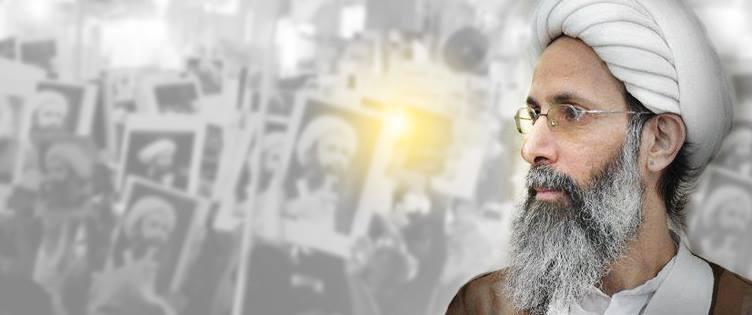
Ayatollah Sheikh Nimr Baqr al-Nimr, an outspoken radical Saudi Arabian Shia cleric, has been the center of controversy and brewing conflict between Shia protesters, militant Shia groups of Saudi Arabia and Bahrain, and their respective Sunni governments. According to a 2012 article by Toby Matthiesen, al-Nimr was, “long a peripheral figure in the local Shia power struggle but now seems to have become the most popular Saudi Shia cleric among local youth.”1 His cause and image is spreading across the Middle East as the latest example of Sunni oppression of Shia in the region and his recent death sentence has become a potent rallying cry for regional Shia militant organizations, particularly those with links to Iran.
Arrested in 2012, Nimr was accused by the Saudi government’s Special Criminal Court of making sectarian statements to cause strife, inviting foreign intervention (shorthand for Iranian influence), and disobeying the king. Following his 2012 arrest, thousands took to the streets and Saudi police shot and killed two protesters.2 In mid-October 2014, Nimr was sentenced to be “crucified”, a process where the sheikh will be beheaded and his body displayed.3
Protests in Saudi began in early 2011 and in part addressed anti-Shia discrimination suffered by the group in the Shia majority area in Saudi Arabia’s oil-rich Eastern Province; primarily zones around the Shia-majority towns and villages near the city of Qatif.4 Following the 2011 Saudi intervention in Bahrain, protests against the Saudi government increased in Bahrain and Saudi Arabia among Shia protesters.5 Following the 2011-2012 protests, links between Bahrain’s and Saudi Arabia’s protest movement spilled over into the more militant circles which actively promoted Nimr’s defiant stance and a hope to combine their fronts against common foes.
Of further interest are Nimr’s own ideological leanings and how they may relate to Shia militant responses. In Frederic Wehrey’s Sectarian Politics in the Gulf, the sheikh is described as a follower of the late Ayatollah Muhammad al-Shirazi.6 Shirazi was one of the founders of a radical Shia political school of thought referred to as the “Shiraziyya.” Shiraziyya clerics have been some of the most influential in the Arab Shia world. Initially al-Shirazi agreed with the Islamic revolutionary ideology of Ayatollah Khomeini, only to split from Khomeini over issues regarding how the new Islamic state (in Iran post 1979 revolution) should be led.7 In one BBC Arabic report, Nimr had been accused by Riyadh of attempting to spread Wilayat al-Faqih.8 Absolute Wilayat al-Faqih is the Khomeinist concept that serves as the basis for the Islamic Republic of Iran. Nevertheless, it was not clarified whether this was the type of Wilayat al-Faqih Nimr was accused of propagating.
Despite the history of strife between Shirazi’s school of thought and that of Ayatollahs Khomeini and Khamenei, al-Nimr appeared to increase public support for Tehran and send other more mixed messages. In 2008, he had also reportedly stated he supported Iran’s nuclear program by saying any attack against it should be met by a response from the Islamic world. That same year, he also said that Saudi Shia may need to call on foreign support (implying Iran) to help press their issues in Saudi Arabia.9 Later in 2009, Nimr reportedly called for secession, stating during a sermon, “Our dignity is more precious than the unity of this land.”10 His statement came as a response to discrimination against Shia in the kingdom and reflected possible repercussions if certain demands made by Shia protesters were not addressed.
Since 2013, in a piecemeal fashion, social media accounts associated with Iranian proxy groups in Iraq have promoted the images and other supportive statements for Ayatollah Nimr al-Nimr.11 While this does not necessitate that Nimr is a true ally or proxy of Tehran, his message and influence is likely seen by Iran as a cause to be promoted in that country’s wider struggle for the leadership of Shia Islam and as a counter to Saudi Arabia.
Nimr’s deep links and strong voice within the Saudi Shia community, particularly among youthful radicals and other more non-violent protestors, has led to Shia militant groups championing his cause from Bahrain and Iraq. Even in Yemen, Shia supporters of Ansar Allah, more commonly known as the Houthis, even launched demonstrations for the jailed cleric.12 Some Bahraini militant groups, which view the struggle of their coreligionists in a geographically close region of Saudi Arabia, as part and parcel to their conflict with the Khalifa monarchy and their Saudi government supporters. Additionally, powerful Iranian proxy groups based in Iraq—which have also maintained anti-Saudi and anti-Bahraini government narratives—have taken to issuing stern threats against Riyadh for his sentence.
The Violent Replies From Saudi Arabia’s and Bahrain’s Militants
Bahraini militant groups demonstrated the most concerted effort in terms of orchestrating violent retorts to Nimr’s jailing and sentence. While other threats and attacks were conducted since the start of 2014, this piece will focus on more recent threats and attacks beginning in the summer of 2014.
Bahrain’s Saraya al-Mukhtar (SaM), a group which once said the Saudi Shia of the Qatif and the Shia of Bahrain constituted one people with common foes, launched the most attacks over the longest period specifically addressing Ayatollah Nimr al-Nimr’s arrest, trial, and death sentence.
Starting in August, SaM attacked an electricity tower in Ar-Rifā near a Bahraini military base. The group filmed the attack and stated it had been a warning related to the imprisonment and trial of Ayatollah Nimr al-Nimr. Around the same time, SaM also began an online countdown for the Nimr verdict and increased their threats against Saudi Arabia. The group also ratcheted up it’s pro-Nimr messaging with the release of numerous images.
This messaging coincided with Saraya al-Mukhtar making its first direct threat against U.S. military personnel in Bahrain on August 11. Through an image posted to Facebook, SaM stated that, “The American cover on al-Saud and Al_Khalifa crimes,,Marines in bahrain will pay the price. [sic]” The message essentially claimed that the U.S. was the real backer for the Khalifa and Saud monarchies. As a result, they bore equal responsibility and could be targeted.
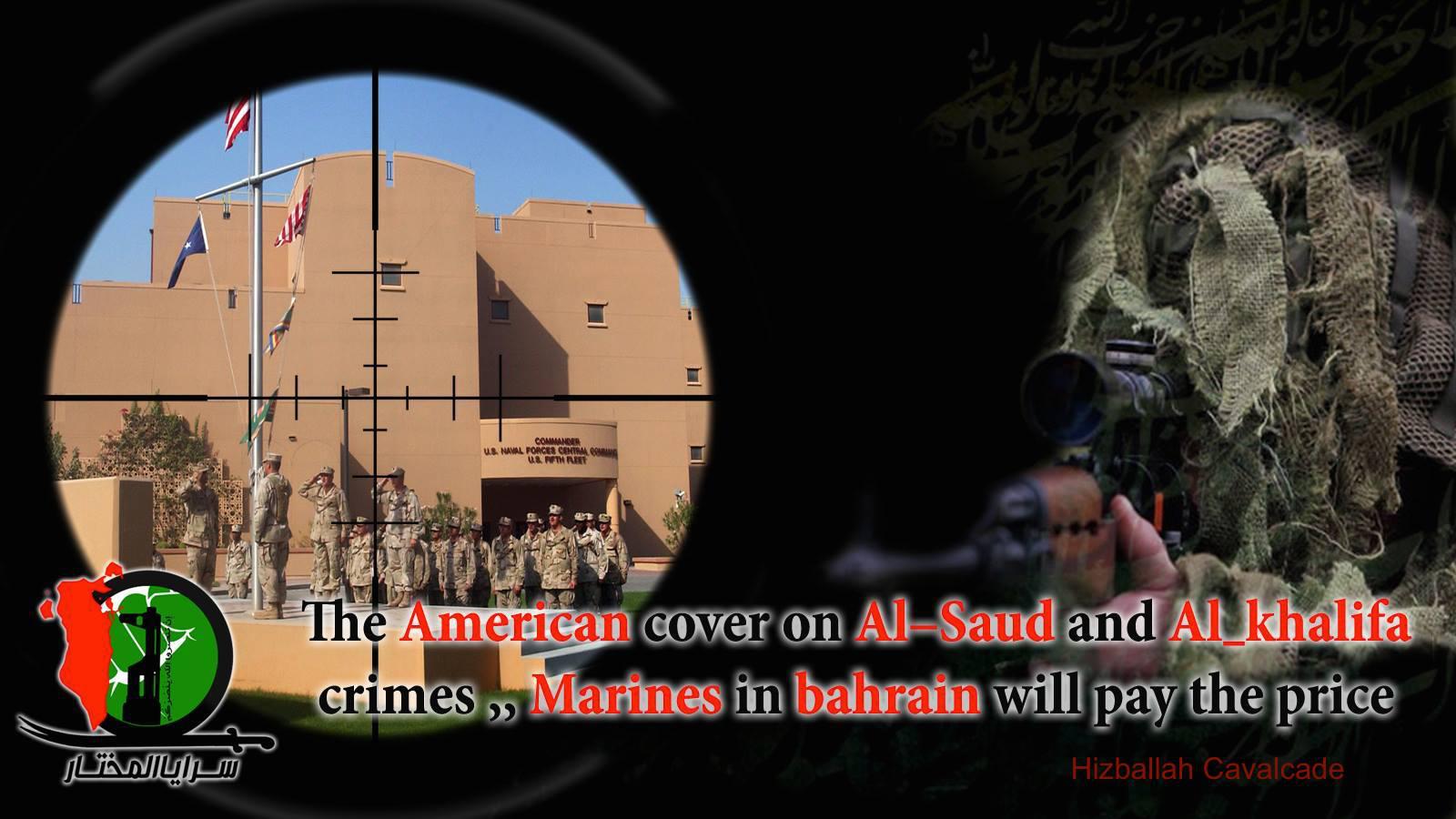
Figure 1: Saraya al-Mukhtar’s anti-American message posted on August 11, 2014.
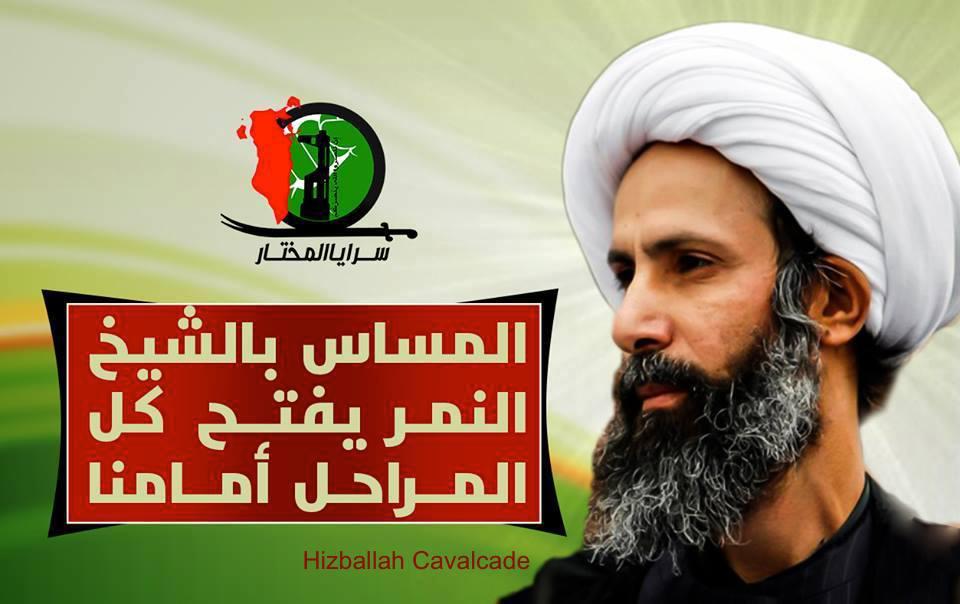
Figure 2: A Saraya al-Mukhtar photo for Ayatollah Nimr al-Nimr posted on August 8, 2014. The poster reads: “Sheikh Nimr[‘s trial and poor treatment] will make us put all options on the table.”
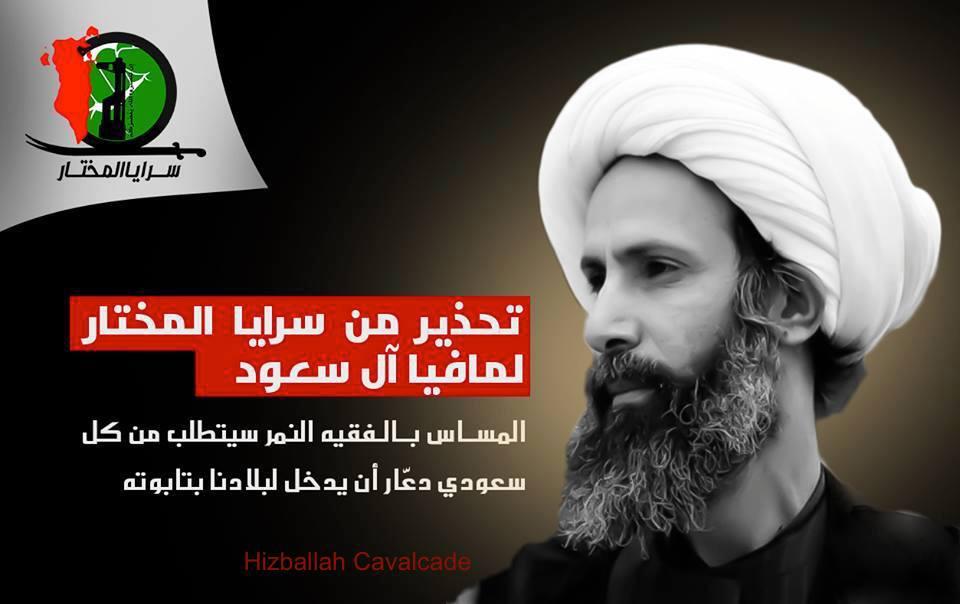
Figure 3: A Saraya al-Mukhtar photo posted on August 10, 2014. This poster reads: [in the red box] “A warning from Saraya al-Mukhtar to the mafia of the Sauds [in white text] Harming Sheikh Nimr will make us put all options [on the table]. Harming the Faqih Nimr means every single Saudi national will enter our country in a coffin.”
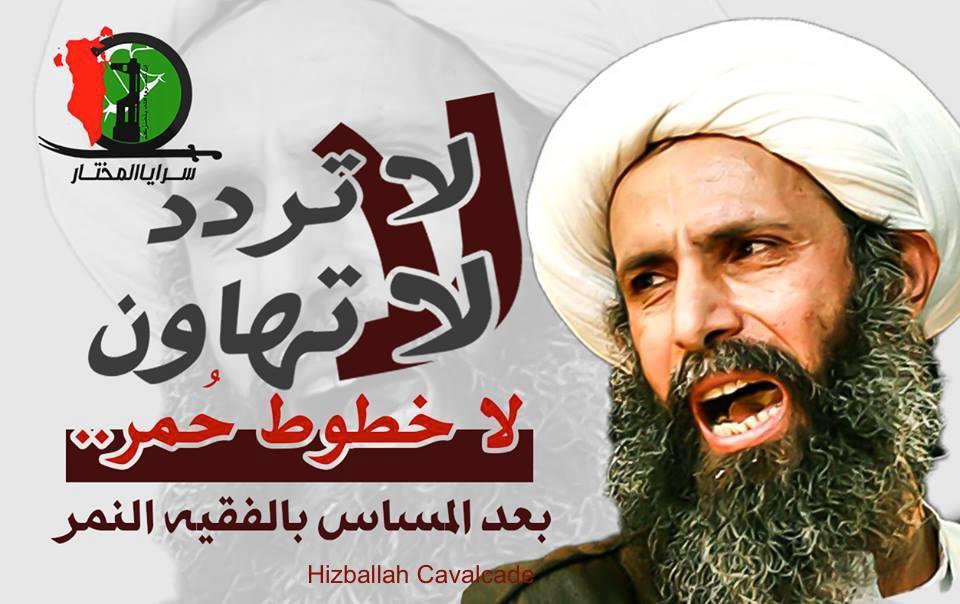
Figure 4: A Saraya al-Mukhtar photo for Ayatollah Nimr al-Nimr posted on August 11, 2014. The poster reads: “Do not hesitate, Do not underestimate, No red lines.. after [the] discrimination [against] the Faqih al-Nimr.”
On September 16, SaM announced it had planted 6 explosive devices in retaliation for al-Nimr’s incarceration. Albeit, these bombs did not target U.S. interests and there was little confirmation as to whether any devices were actually planted.
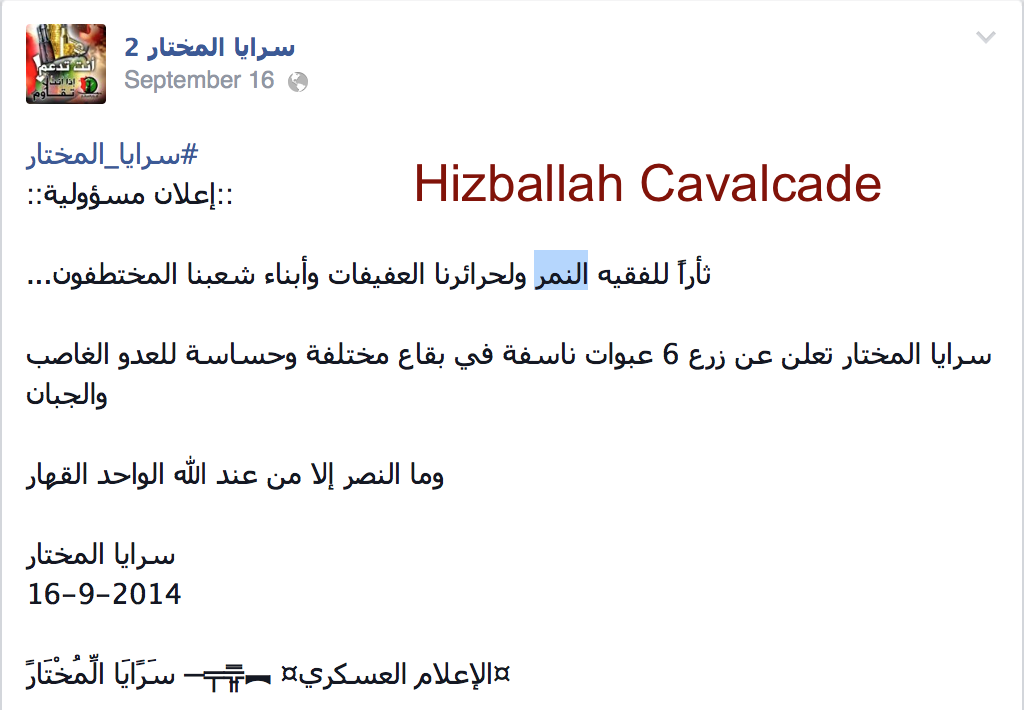
Figure 5: Saraya al-Mukhtar’s September 16 claim to have planted 6 bombs.
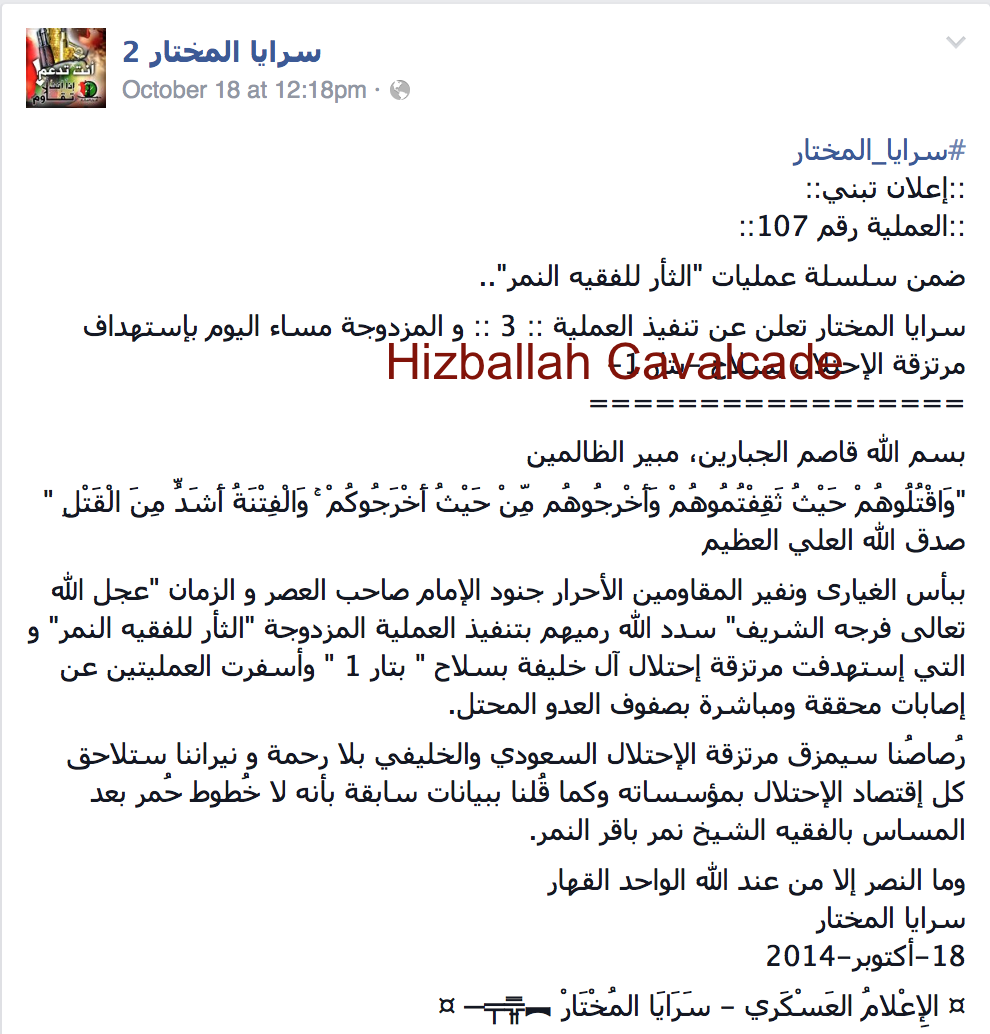
Figure 6: Saraya al-Mukhtar’s claim of 2 attacks on October 18, 2014.
Then on October 9, SaM claimed to conduct an attack in the town of Karana, Bahrain utilizing an improvised firearm. SaM’s claim of responsibility stated they attacked, “herds of mercenaries” (shorthand for Bahraini police and other security entities). On October 15, SaM claimed to have launched attacks in Sanabis and Aker, Bahrain targeting “mercenaries”. In another statement from that day, the group threatened, “The occupying mafia of al-Saud and al-Khalifa [would face]…consequences for the death sentence.” Later, on October 18, SaM claimed two attacks, referring to them as “Revenge of the Faqih [an expert in Islamic jurisprudence] Nimr.” SaM’s statement declared that it had injured “ranks of the enemy occupier.”
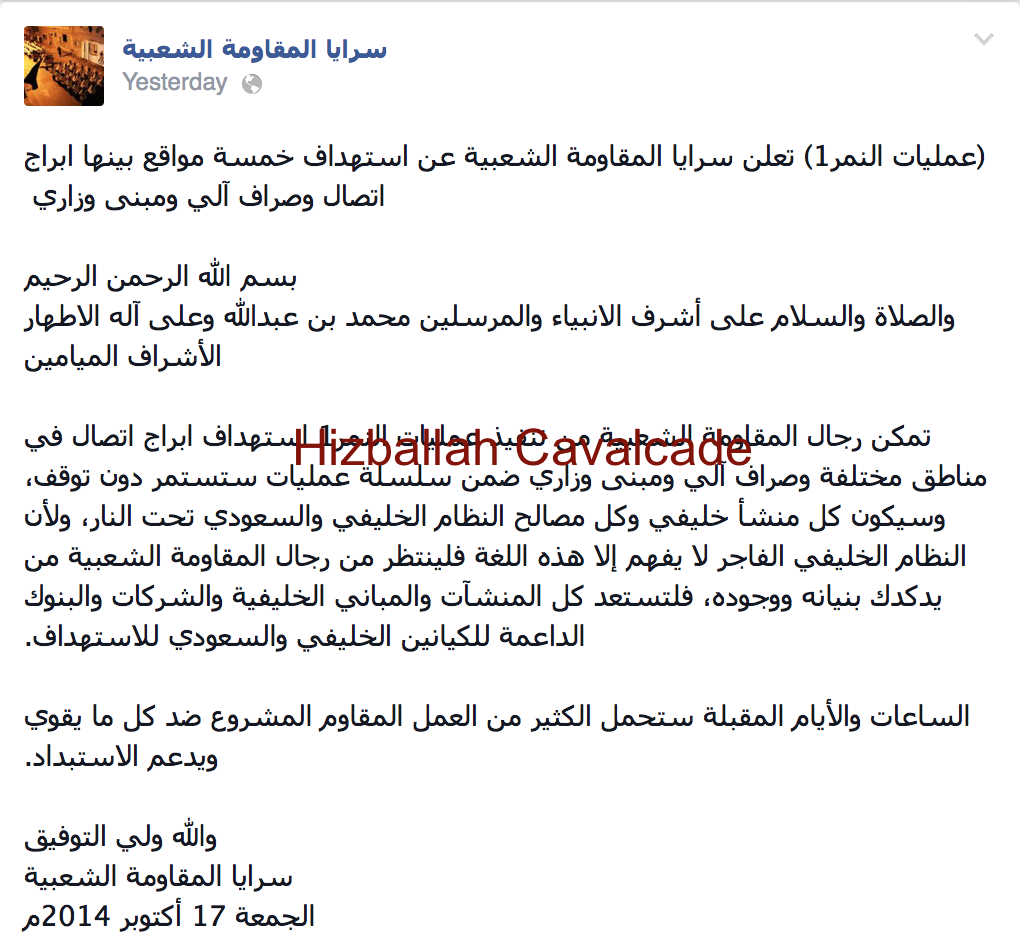
Figure 7: SMS’s claim of attack in honor of Sheikh Nimr.
Bahraini militant group, Saraya
Category: The Ḥūthīs
Minbar al-Tawḥīd wa-l-Jihād presents a new Fatwā from Shaykh Abū al 'Izz al-Najdī: "Ruling On Fighting the Ḥūthīs With the Yemeni Government"

Click the following link for a safe PDF copy: Shaykh Abū al ‘Izz al-Najdī — “Ruling On Fighting the Ḥūthīs With the Yemeni Government”
_____________
To inquire about a translation for this fatwā for a fee email: [email protected]
New statement from al-Qā’idah in the Arabian Peninsula: "On the Martyrdom Operations on the Ḥūthīs in Ṣa'adah and al-Jawf"
UPDATE 6/1/12 2:09 PM: Click here for an English translation of the below Arabic statement.
___________
—

Click the following link for a safe PDF copy: al-Qā’idah in the Arabian Peninsula — “On the Martyrdom Operations on the Ḥūthīs in Ṣa’adah and al-Jawf”
___________
To inquire about a translation for this statement for a fee email: [email protected]
New Fatwā from al-Qā’idah in the Arabian Peninsula's Sharī'ah Committee: "On Fighting the Shī'ah Ḥūthī's in the Southern Arabian Peninsula"
UPDATE 2/1/12 3:41 PM: Here is an English translation of the below Arabic statement:

Click the following link for a safe PDF copy: al-Qā’idah in the Arabian Peninsula — “On Fighting the Shī’ah Ḥūthī’s in the Southern Arabian Peninsula” (En)
__________
—

Click the following link for a safe PDF copy: al-Qā’idah in the Arabian Peninsula — “On Fighting the Shī’ah Ḥūthī’s in the Southern Arabian Peninsula”
__________
al-Malāḥim Media presents a new audio message from al-Qā’idah in the Arabian Peninsula's Shaykh Ibrāhīm bin Sulaymān al-Rubaysh: "Support for Our Brothers in Dammāj"
UPDATE 12/13/11 3:08 PM: Here is an Arabic transcription of the below Arabic audio message:
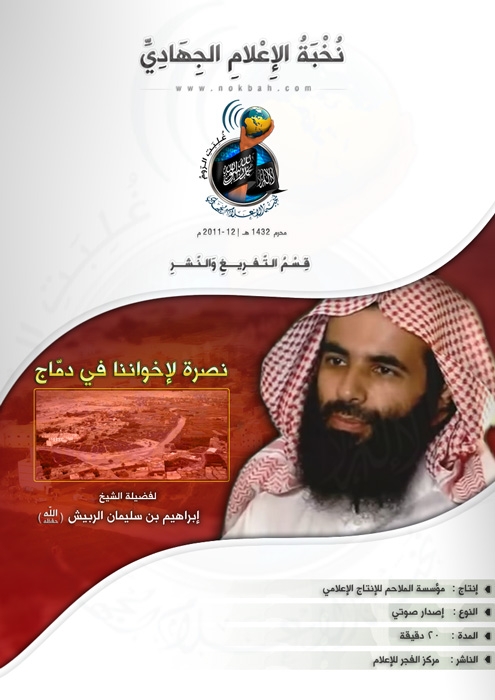
Click the following link for a safe PDF copy: Shaykh Ibrāhīm bin Sulaymān al-Rubaysh — “Support for Our Brothers in Dammāj” (Ar)
_________
—

Shaykh Ibrāhīm bin Sulaymān al-Rubaysh — “Support for Our Brothers in Dammāj”
________
New article from Abū Usāmah al-Kūbī, a member of the Shamūkh al-Islām Arabic Forum: "The Rāfiḍah Alliance .. The Options of Ahl al-Sunnah .. American Alternatives in the Peninsula .. Letter to al-Anṣār"
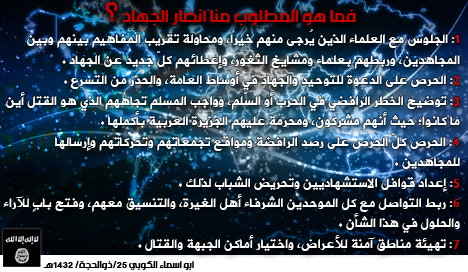
فلقد أوشك الخطر المتوقع على الجزيرة العربية أن يكون واقعاً من قبل الرافضة المنتشرين في أرض الحرمين شرقاً وغرباً وجنوباً ،حتى في أطهر البقاع لأهل السنة المدينة النبوية وعلى أطراف الجزيرة العربية، بل أصبح البعيد من الجزيرة قريباً كما نشاهد الأحداث الحاصلة في الساحة الإقليمية بين الحرس الثوري الإيراني وبين الجيش العراقي الرافضي، وما تم بينهم خلال الأيام القليلة الماضية من توحدٍ عسكري ضد ما سموه بالأعداء المشتركين في المنطقة وخارجها، فأصبح لإيران اليوم حدوداً برية مع أرض الحرمين ومع الكويت، بعد ما كانت حدودها بحرية فقط، وهذا بداية وقوع الخطر الرافضي.
وقد ظهر أيضاً وضع أمريكا، وسيناريو الفرار من المعركة مع إيران، كما صرح المسؤولون الأمريكيون على قناة الجزيرة وبعض القنوات الأخرى؛ أن أمريكا ستعزز وجودها في البحر وفي الكويت؛ أي ستلغي تواجدها في الخليج براً، أو ستقلّله إلى أدنى حدّ لإدارة مهام قواتها، وتكثف وجودها البحري حفاظاً على مصالحها البترولية والاقتصادية في الممرات البحرية، وتجنباً للصدام العسكري مع إيران براً، وقد سحبت أمريكا قواتها من العراق، ولم يبقَ سوى القليل حمايةً للسفارة هناك، وستنتهي من سحب المتبقي خلال أسابيع، وهذا المصرح به.
ما هي الخيارات للحكومة السعودية، والخيارات للتيار السني، والتيار العلماني؟
ستحاول الحكومة السعودية بالبحث عن بديل بدل أمريكا في الدفاع عنها من قبل الدول الكبرى، ولن يحصل لها ذلك؛ حيث أن الارتباط بين أمريكا والدول القادرة على اتخاذ مثل هذا القرار كبريطانيا وفرنسا وألمانيا قويٌّ ومصيري، ولن يتجرؤوا على اتخاذ هذا القرار الأحادي بدون أمريكا، أما روسيا فعداؤها لآل سعود قديم؛ لما كان لآل سعود من دور في حرب الروس في أفغانستان، والصين حليفة للروس وتدور في فلكها، وإيران أقرب لها ولاءً.
فليس لآل سعود سوى خيارين:
إما التحالف مع اليهود، وهذا ما تسعى إليه أمريكا؛ لتخرج من تبني القضية اليهودية، التي هي من أسباب حرب المسلمين عليها، ويكون البديل هم آل سعود، ويصبح اليهود مؤمّنون من الشعوب الإسلامية الثائرة في دول الطوق، بالفتاوى الشرعية من قبل علماء آل سعود، وكما أفتوا بالصلح مع اليهود بالأمس، فسيفتون لهم بالعهد والذمة اليوم.
الخيار الثاني:
هو إعطاء الرافضة السلطة في الدولة السعودية على حساب أهل السنة، ويكون المذهب الرافضي هو مذهب الدولة، وهذا ما سيحاوله التيار الليبرالي العلماني وبعض من ينتسب إلى السلفية السنية من المشايخ الذين أصبحوا يحملون عقائد الأكثرية الإعلامية أمثال (عائض القرني والعودة ) ومن على شاكلتهم؛ كحلّ سلمي لتعايش بلا حرب، نسأل الله العافية والسلامة .
وأما الخيار السني، فليس لهم سوى خيارين:
واحد للنجاة، وهو التوبة من خذلان المسلمين، ومن ترك فريضة الجهاد التي حوربت من أهل العلم قبل العامة، وصوّرت كأعظم جريمة يفعلها المسلم، وصُوّر المجاهدون بأنهم أكبر فتنة على الإسلام والمسلمين، وبأنهم سبب كل شر، وبأنهم الذين جعلوا الكفار يعادون أهل الإسلام ويقتلونهم، وغير هذه المفاهيم التي صوّرها الإعلام بفتاوى علماء أرض الحرمين -إلا من رحم الله- ضد المجاهدين، فلابد من تصحيح هذه المفاهيم الخاطئة، وتوضيح الحق الذي عليه المجاهدون ولو كان فيه شيء من الغضاضة على النفس، وتوحيد الصف مع المجاهدين تحت توحيد رب العالمين والجهاد في سبيل الله؛ لتكون كلمة الله هي العليا، مادامت منطلقات المجاهدين وأصولهم سنية سلفية مجتهدين على فهم السلف .
والخيار الثاني:
هو البقاء مع الطاغوت والرضا بما هو عليه، ومن ثم يحلّ بكم ما حلّ بغيركم من المسلمين المتخاذلين عن الجهاد من قتلٍ وتشريد وانتهاك للأعراض، فيصرف الله عنكم من ينصركم كما صرفكم عن نصرة غيركم من المسلمين، الذين كانوا يستنصرونكم وكنتم تقولون ليس لهم راية، وحربهم حرب فتنة، وكما تُدين تُدان، وستذكرون ما أقول لكم عما قريب إن لم تتوبوا .
وسؤال،
هل سيكون اليهود هم البديل لأمريكا في الحرب مع آل سعود ضد إيران ؟
وما دور اليهود الحقيقي في هذه الحرب، هل سيكون فتيل حرب فقط أم ستكون حرب مصيرية ؟
وهل سيكون سقوط بشار الأسد مع هذه الضغوط من صالح اليهود، أم من صالح أهل السنة ضد اليهود والرافضة في الشام، وهل هذه الحرب من اليهود والتصعيد ضد إيران مخلّصة لبشار ؟
1: الجلوس مع العلماء الذين يُرجى منهم خيرا، ومحاولة تقريب المفاهيم بينهم وبين المجاهدين، وربطهم بعلماء ومشايخ الثغور، وإعطائهم كلّ جديد عن الجهاد .
2: الحرص على الدعوة للتوحيد والجهاد في أوساط العامة، والحذر من التسرع .
3: توضيح الخطر الرافضي في الحرب أو السّلم، وواجب المسلم تجاههم الذي هو القتل أين ما كانوا؛ حيث أنهم مشركون، ومحرمة عليهم الجزيرة العربية بأكملها .
4: الحرص كلّ الحرص على رصد الرافضة ومواقع تجمعاتهم وتحركاتهم وإرسالها للمجاهدين .
5: إعداد قوافل الاستشهاديين وتحريض الشباب لذلك .
6: ربط التواصل مع كل الموحدين الشرفاء أهل الغيرة، والتنسيق معهم، وفتح بابٍ للآراء والحلول في هذا الشأن .
7: تهيئة مناطق آمنة للأعراض، واختيار أماكن الجبهة والقتال .
كتبه راجي عفو ربه أبو أسماء الكوبي 25/ذوالحجة/ 1432هـ_________
al-Malāḥim Media presents two new statements from al-Qā’idah in the Arabian Peninsula
UPDATE 9/16/11 8:58 AM: Click here for an English translation of the first Arabic statement listed below.
_______
—

Click the following links for safe PDF copies:
al-Qā’idah in the Arabian Peninsula — Statement Claiming Responsibility For The Martyrdom Operation Against the Ḥūthīs That Killed and Wounded Hundreds
al-Qā’idah in the Arabian Peninsula — Report on the Bombing of the Hospital in Ja’ār
______
al-Qā’idah in the Arabian Peninsula releases Issue #16 of its Arabic language magazine Ṣadā al-Malāḥim
UPDATE 2/16 8:32 AM: Flashpoint Intel has translated two of the articles from the below magazine:
- “The Explosive Packages: Why? And Until When?”
- “Light On: The Explosive Packages and Scandalizing the Tyrants”
—
UPDATE 2/15 3:59 PM: Check out Gregory Johnsen’s take on the first article in the below magazine that is about the uprising in Tunisia titled “To Our People in Tunisia Don’t Waste What You Gained” on page three.
—
NOTE: For those who know Arabic I would highly recommend reading through this since it will provide more insight into AQAP than Inspire Magazine, especially with regard to internal Yemeni affairs. Previous issues: #15, and #14. If you are interested in any other previous issue send me an email and I will send you a copy.
There is a new article on page 15 from AQAP’s deputy leader Abū Sufyān al-Azdī (Sa’īd al-Shehrī) titled “Muslim Pride.” It was recently reported that Sa’īd al-Shehrī was killed, but there has been no confirmation yet from AQAP. There is also a new one from AQAP’s top Sharī’ah official Shaykh Abū Zūbayr ‘Adīl bīn ‘Abdullah al-Abāb on page 25 titled “Independence of the Religious Scholars.” Also featured are articles on the parcel bomb plot, the Ḥūthīs, and Somalia.
—
Click here for the original in Arabic: Sada al-Malahim Issue #16
al-Qā’idah in the Arabian Peninsula’s al-Malāḥim Media releases Inspire Magazine Issue #4
UPDATE 2/8 11:03 AM: Here is an Arabic translation of issue four of AQAP’s English language magazine Inspire:

Click the following link: Inspire Magazine 4 (Ar)
—
UPDATE 2/7 11:54 AM: Here is a Russian translation of issue four of AQAP’s English language magazine Inspire:

Click here: Inspire Magazine 4 (Russian)
—
NOTE: Here is the first, second, and third issue of Inspire Magazine. Below is a brief summary of what is in this magazine. When I have more time I hope to read the content more in depth and be able to dig deeper into this.
The magazine begins with a letter from the editor, Samīr Khān, about the Shi’a in their midst, as well as a reprint of AQAP’s statement following the car bombing against the Ḥūthīs this past November titled “Statement on the Operations of Defense for the People of the Sunnah.” Then after a series of pages of quotes from friends and foes Khān pens an article reiterating the importance of farḍ al ‘ayn (individual obligation) for jihād. After this, there is a reprint of part of Adam Gadahn’s recent video message from October titled “The Arabs And Muslims: between the Conferences of Desertion .. and the individual Duty of Jihād,” which I analyzed here. Following this there is an article from Abū Zūbayr ‘Adīl bīn ‘Abdullah al-Abāb, AQAP’s chief religious authority, where he answers questions about targeting non-Muslims and Yemeni soldiers. Muḥammad al-Ṣana’ānī follows this up with an article on Roshonara Choudhry who stabbed the UK MP Stephen Timms, and Taymūr ‘Abd al-Wahāb who was responsible for the recent attack in Stockholm. After this Abū Khowla pens a piece titled “Which is Better: Martyrdom or Victory?” Then there is a roundup of the recent jihadist activities in Abyan by Abū Zakarīā al-Erītrī, which confirms that there are members of AQAP from Eritrea. After this, there is a long excerpt from Abū Muṣ’ab al-Sūrī’s magnum opus The Global Islamic Resistance Call. Then in the section titled Open Source Jihād it details how to burn down a building, training with an AK-47, and advice for those that want to help with AQAP’s media outlet al-Malāḥim Media, which includes:
- Archiving
- Hear the world
- Your articles
- News flash
- Graphics
- Translations
Following this they reprint sections of Shaykh Abū Muṣ’ab Moḥammed ‘Umayr al ‘Awlaqī’s essay titled “Why I chose al-Qā’idah” who was killed in late 2009. After this is the feature article in the entire magazine, which is highlighted on the cover of it from Anwar al ‘Awlaqī titled “The Ruling of Dispossessing the Disbelievers Wealth in Dār al-Ḥarb [the Abode of War].” This is a continuation of advice regarding the economic jihād, which AQAP boasted about in the third issue of Inspire magazine and written about by Daveed Gartenstein-Ross in Foreign Policy following the failed UPS parcel plot. I would be interested to hear his further thoughts about this in light of this new article from ‘Awlaqī. After ‘Awlaqī’s article, there is one from Hazīm Nūr titled “The Call of the Qur’ān” about the importance of the concept tawḥīd (oneness of God), which is one of the most fundamental concepts in Islām. Inspire magazine concludes by recapping recent releases from al-Malāḥim Media including: Issue #15 of AQAP’s Arabic language magazine Ṣadā al-Malāḥim, “Martyrs of the Arabian Peninsula #4 – Abū Hammām al-Qaḥṭānī (Nāyīf bin Muḥammad bin Sa’īd al-Kūdurī al-Qaḥṭānī),” Shaykh Ibrāhīm bin Sulaymān al-Rubaysh’s audio message: “Between Islamists and Liberals”, an audio message from Shaykh Abū Zūbayr ‘Adīl bīn ‘Abdullah al-Abāb: “We Responded to the Sharī’ah of God, not the Laws of ‘Alī Ṣāliḥ”, a tribute to Zayyid al-Daghārī al-’Awlaqī by Shaykh Ibrāhīm bin Sulaymān al-Rubaysh, and a video titled “By the Lord of the Ka’abah, I Triumphed [Part 2]” among others. After this it tells the reader how to get in contact with Inspire magazine and like the previous issue it also lists Muslim prisoners.
—
Click here: Inspire Magazine 4
New Interview with 'Abd Malik Badr ad-Dīn al-Ḥūthī, leader of the Ḥūthīs
NOTE: For a comprehensive history of the Ḥūthīs read the RAND monograph “Regime and Periphery in Northern Yemen- The Huthi Phenomenon.” Also, check out my article “Round Seven in Northern Yemen?” in Foreign Policy’s Middle East Channel, which discusses the Ḥūthī conflict with the Yemeni government.
—

قامت “الحقيقة” – نشرة ثقافية نصف شهرية تصدر في محافظة صعدة – بإجراء حوار هام مع السيد عبدالملك بدرالدين الحوثي الذي تحدث فيه عن أهم المستجدات على الساحة والأسباب الحقيقية التي
تعرقل المفاوضات وتؤثر سلباً على تنفيذ الاتفاقيات كما تطرق الحوار إلى االاعتداءات الأمريكية والقاعدة ، تناول أيضاً الوساطة القطرية واحداث سفيان والتحالف مع اللقاء المشترك ورؤيتهم حول الحلولالتي قد تخرج اليمن من النفق المظلم الذي يسير فيه.. نترككم مع نص الحوار :
الحقيقة: إلى أين وصلت المفاوضات بينكم وبين السلطة؟ وما هي العوائق التي تقف أمام تنفيذ بنود الاتفاق ؟
السيد: المفاوضات وصلت إلى مرحلة متقدمة على الورق وهناك تفاهمات هامة لكن مشكلة السلطة أنها غير وفيّة بالتزاماتها فهي تقدم التزامًا وتوقع إتفاقاً ثم لا تكون صادقة عند وعودها ولا التزاماتها بل وأحيانًا لا تكتفي بالتهرب من التزاماتها بل تعمل على العرقلة للاتفاقات والحيلولة دون تطبيقها ومن الأمثلة الواضحة موضوع السجناء فهناك الكثير من الاتفاقيات والمحاضر الموقعة بخصوص الإفراج عنهم، وهناك إعلان واضح في ليلة 22 من مايو وقرار بالإفراج عنهم وأكدته اللجنة المسماة باللجنة الأمنية وما يسمى بوزير العدل وما تسمى بمصلحة السجون ونقلوا الدفعة الأولى إلى صعدة وعلى أساس أن يأتوا ببقية الدفع ويتم الإفراج عنهم، ثم لم تلبث السلطة أن نكثت الاتفاقيات واستمرت في احتجازهم غير المبرر، وهكذا الأمور الأخرى حينما نصل إلى مرحلة التطبيق يتهربون ويصنعون العراقيل والكل يعرف عن السلطة تجردها من القيم والمبادئ ونكثها وغدرها ولكن ليس من مصلحتها ولا من مصلحة البلد استمرارها في الطريق الخاطئ الذي تسلكه وكان عليها في هذه الفترة لو كانت – كما تدعي – جادة في الوصول إلى حلول وحريصة على السلام أن تقوم بالإفراج عن السجناء وإعمار ما دمّرته وخربته بعدوانها وتعويض المواطنين المتضررين من العدوان ومراجعة سياستها الخاطئة وإعطاء المناطق المتضررة من العدوان حقها من الثروة العامة التي يجب أن يستفيد منها المحرومون من أبناء الشعب ومعاملة أبناء الشعب المظلوم بكرامة وهذا كان – لو أنها قامت به- التصرف الحكيم والصحيح بدلاً من إثارة المشاكل والإمساك بأوراق وأدوات التأزيم والتعقيد للوضع والجميع يعرف في المناطق المتضررة من العدوان أن السلطة لم تقم بأي خطوة إيجابية تجاه هذه المناطق ولو توفرت لدى السلطة الإرادة السياسية اللازمة وكان لديها قدرًا ولو يسيرًا من المصداقية وشيئًا من الحرص على المصلحة العامة للبلد وقليلا من الوعي بأن مصلحتها في التقارب مع الشعب لا في العداء له لأمكن تجاوز الكثير من العراقيل لكن موقف السلطة من الشعب سيء جدًّا وهذا بشكل عام في الشمال والجنوب والوسط، وهناك ثلاثة أسباب تعرقل المفاوضات وتؤثر على الاتفاقيات:
السبب الأول: ارتهان السلطة للخارج المعادي للشعب في قراراتها ومواقفها فهي تتاجر بالبلد وتجعل منه قربانًا تقدمه لأمريكا ولجهات إقليمية معروفة ولذلك فرَّطت في سيادة البلد وجعلتها مباحة للآخرين وكأن اليمن بلد مباح ليس له سيادة ولا حرمة ولا لأبناءه كرامة، وهذا الارتهان وهذه العمالة والاتكاء على الخارج دليل واضح أن السلطة فاقدة لتأييد الشعب وأنها ليست معتمدة عليه ولا مستندة إليه، وبما أنها أدخلت نفسها في حسابات الآخرين فهذا جعلها متضاربة متناقضة في مواقفها وقراراتها وجعلها في حالة كبيرة من الاضطراب، وهي في حالها هذا غير مأمونة على الشعب والبلد لأنها لم تعد تحسب للشعب والبلد أي حساب في مواقفها وقراراتها.
السبب الثاني: موقف السلطة من الشعب نفسه فالقائمون على السلطة والنافذون فيها معروفون بأنهم لا يحترمون الشعب نهائيا ولا يعاملونه على أساس مبادئ القرآن الكريم التي تكفل للإنسان كرامته وعزته بإيمانه {وَلَقَدْ كَرَّمْنَا بَنِي آدَمَ} {وَلِلَّهِ الْعِزَّةُ وَلِرَسُولِهِ وَلِلْمُؤْمِنِينَ} كما أنه ليس لديهم ذرة من الحرص على مصلحة الشعب وليسوا ممن يخاف الله ويستشعر المسئولية أمام الله والسؤال والحساب والعقاب فيكون ذلك حافزًا لهم على أن يتقوا الله في الشعب فهم مجردون من الإيمان، ولا هم أيضا يتوقعون الحساب والمساءلة من الشعب لأنهم دائما يعملون على إضعافه وتحطيمه واستعباده وإذلاله وتفريق أبناءه، ولا هم ذوو ضمير ونفوس طيبة بل يفهمون السلطة بأنها التسلط والقهر والإذلال والنهب لثروة الشعب، والمواطَنَة، بأنها العبودية والخضوع المطلق، وهم غارقون في أنانيتهم ومصالحهم الشخصية ومزهوون بالطغيان والكبر ونظرتهم إلى الشعب قائمة على الاحتقار والازدراء وكأن الشعب قطيع من الغنم وملك لهم، ولكن الاستياء الشعبي يتزايد وأكثر من أي وقت مضى والوعي ينمو وسياستهم هذه فاشلة، وأريد القول أن هذه النظرة إلى الشعب وهذا الموقف السيء جعلهم غير مهتمين بحلول صحيحة وعادلة ولا حريصين على مصلحة الشعب ، ومهما كان الاتفاق مفيدًا لتهدئة الوضع وحقن الدماء ومعالجة الإشكالات فإنهم لا يتحرجون من النكث والاختلاف والتنصل وهذه إشكالية كبيرة لأنها تعود إلى نفسيتهم وثقافتهم وطريقتهم في التفكير والتصرف واتخاذ القرار والموقف .
السبب الثالث: هو النفوذ الأجنبي الذي أيضًا تجاوز السلطة وأصبح له أدوات وأيادي أخرى إضافية فلم يكتف بالسلطة التي كانت ترغب أن تكون العميل الوحيد للخارج بل عمد إلى جهات بعضها من السلطة وأكثرها من المنافقين وهذا أسهم مع تردد السلطة وعدم اهتمامها إلى عرقلة الاتفاقيات والتصعيد للوضع كلما كان هناك موعد مع خطوة إيجابية .
الحقيقة: بعد الحرب الخامسة وقبل سفره إلى روسيا وجه إليكم الرئيس على عبدالله صالح تهديدات وشتائم أجبتم عنها في مقابلة مع صحيفة الناس ، وبعد الحرب السادسة وقبل سفره أيضًا إلى روسيا وجهت إليكم تهديدات رئاسية حسب ما تناقلته وسائل الإعلام قبل أسابيع.. ما مضمون هذه التهديدات؟ وما سر هذا التوقيت الذي يأتي قبل زيارة الرئيس إلى روسيا؟ وماذا كان ردكم على تلك التهديدات ؟
السيد: منطق التهديد لأبناء الشعب غير شجاع ولا مشرف ويصدق على أصحاب التهديد أنهم أذلة على الكافرين أعزة على المؤمنين، وكان المشرّف أن يكون التهديد لأعداء الأمة والإسلام الذين يمثلون خطورة
